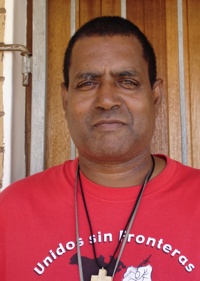- About
- Topics
- Story
- In-Depth
- Picks
- Opinion
- News
- Donate
- Signup for our newsletterOur Editors' Best Picks.Send
Read, Debate: Engage.
| September 10, 2023 | |
|---|---|
| topic: | Racism |
| tags: | #South Africa, #racism, #apartheid, #environmental racism, #pollution |
| located: | South Africa |
| by: | Cyril Zenda |
A United Nations Special Rapporteur who recently concluded a visit to South Africa has urged Pretoria to "redouble efforts" to end environmental racism. This harmful practice includes deliberately placing landfills and polluting industrial plants in low-income and migrant communities, often along racial lines.
This habit, a relic of the entrenched racial practices of nearly 350 years of white domination over South Africa, has proven to be resistant to change during the nearly three decades of democratic majority rule.
In his findings, Marcos Orellana, the UN Special Rapporteur on Toxics and Human Rights, claims that the legacy of pervasive air, water and chemical pollution disproportionately impacts marginalised and poor black communities in Africa’s most advanced economy.
"The challenges to overcoming the legacy of environmental racism are enormous, and they are compounded by structural inequality, widespread poverty, unemployment, and new environmental threats such as hazardous synthetic chemicals and the climate emergency," noted Orellana, who was on a fact-finding visit to South Africa from 31 July to 11 August 2023.
According to the expert, the mining industry, which for many decades contributed to South Africa’s economic development, left thousands of deserted mines and mine waste dumps around the country. Orellana said that often hope for pollution prevention and remediation upon mine closures is lost due to poor policy enforcement.
"The result is a landscape scarred by abandoned mines, tailing dumps and acid mine drainage," he stated.
Dust from coal mines, along with ashes, mercury emissions and PM2.5 from coal burning have a severe negative impact on South Africa's air quality, as the country generates almost 90 per cent of its electricity from coal. Although South Africa has begun to transition away from fossil fuels for energy production, the process faces serious obstacles, including the licensing of new coal mines and offshore oil and gas drilling, the expert said.
The problem is further exacerbated by the fact that over 70 per cent of South Africa's land is owned by a white minority that continually resists sharing this resource with the country's black majority.
Desmond D’Sa, the coordinator of South Durban Community Environmental Alliance (SDCEA), an environmental justice organisation, told FairPlanet that since the inception of democracy in South Africa in 1994, environmental racism has continued to flourish - with predominately people of colour being affected the most.
"Huge land grab of neighbourhoods continues to occur with regular displacement," D’Sa said.
He added, "When the facilities explode, the people most affected are poor black neighbourhoods who find that their health is affected and no recourse to medical doctors or medication as in the case of the United Phosphorous company.
"The chemicals from these facilities are spewed out into rivers and oceans, destroying marine life, and in its wake thousands of livelihoods and [crops are] also destroyed."
According to Professor Leonard Llewellyn, an environmental sociologist from the University of South Africa (UNISA)’s School of Ecological and Humanity Sustainability, the advent of democracy in South Africa marked a significant turning point, as the government made notable strides in establishing a comprehensive legal framework aimed at preventing and managing environmental contamination.
"This framework was envisioned to tackle the persistent remnants of environmental racism, while also fostering increased citizen engagement," he wrote to FairPlanet.
He added, however, that despite these efforts the situation remains largely unchanged, with vulnerable citizens continuing to endure the brunt of environmental risks emanating from activities such as mining, landfills and refineries.
"Regrettably, the geographical landscape, even after the era of apartheid, has exhibited minimal transformation, further entrenching environmental injustices."
Professor Llewellyn claimed that the factors contributing to this stagnation are numerous.
"The democratic transition witnessed the government embracing a macroeconomic model that prioritised the expansion of industrial modes of production. While this approach has ostensibly driven economic growth, it has also given rise to a glaring wealth disparity, disproportionately affecting the impoverished segments of society who find themselves disproportionately burdened by the repercussions of industrial pollution."
He added that declining governance standards in South Africa are also contributing to the problem, as government institutions are struggling to actively and transparently oversee corporate practices.
"On the political front, the environment has received scant attention from the ruling party, resulting in a lack of comprehensive and integrated spatial development planning. This narrow focus has hindered the prospects of addressing environmental concerns holistically.
He further stated that since the establishment of democracy in the country, the interface between citizens and the state has been weak, particularly when to comes to matters of industrial development, where participation often appears symbolic and deep-rooted corruption precludes a transparent public discourse.
He referenced the mining sector as an example, claiming this industry has become largely synonymous with high-risk activities and corruption scandals.
"The lack of effective governance has allowed major industries to exploit regulatory gaps with impunity," he said, citing "Egregious instances of contracts being awarded based on bribery, personal connections, traditional leaders engaging in corruption with corporations over land use for mining development, or officials’ conflicting business interests, implicating even the upper echelons of government."
But as professor Llewellyn sees it - hope is not lost. South Africa, he claims, has seen the emergence of a strong environmental justice movement over the last decade. The movement actively participates in civil society and community networks, engaging in solidarity efforts and activities aimed at holding corporations and government accountable for environmental injustices.
This movement includes D’Sa’s SDCEA, which is made up of 19 affiliates that advocates for better air quality in the highly-industrialised South Durban area.
Other environmental organisations such as GroundWork and Vukani Environmental Movement (VEM) successfully took the government to court for "violating the constitutional right" of citizens to breathe clean air, in the so-called 'deadly air' case. The Green Connection and Sustaining The Wild Coast have also been advocating for similar environmental rights.
The Vaal Environmental Justice Alliance (VEJA), an alliance of five environmental justice organisations, successfully took on global steel giant ArcelorMittal in a landmark court case concerning community access to corporate environmental records.
"To forge a more equitable and sustainable path forward, urgent measures are imperative," Llewellyn said. "Bolstering law enforcement resources to combat corruption is of paramount importance, as these detrimental practices continue to undermine progress. Equally critical is the implementation of bottom-up approaches to development planning, which would empower communities and stakeholders to shape their own destinies."
He added that addressing environmental injustices requires a concerted effort to shift from rhetoric to action, as well as fostering inclusive development and robust governance mechanisms that safeguard both the environment and the well being of the public.
Professor Rajendra Chetty, a post-colonial scholar at South Africa’s University of Western Cape, told FairPlanet that in order to address the effects of environmental racism and spatial injustice, it is crucial for the South African government and provincial decision-makers to engage in critical self-examination concerning the existing frameworks that dictate land and environmental policies.
"Especially important is engaging with historical injustice like dispossession of black people and relocation to ghettos and peri-urban spaces without infrastructure, employment and natural resources like water and fertile land," professor Chetty said.
He added that South Africa's capitalist economy relies on poor people for cheap labour and has little concern for workers' housing or food security.
"What the country needs is a radical reconstruction of its capitalist and neo-liberal economic framework that prioritises the rich and generates profit rather than the well-being of the subaltern," he said.
He added, "There is also a need for a decolonial ecological transition that acknowledges the experiences of marginalised communities in their engagement with land instead of the knee-jerk reaction when fires or floods occur in squatter settlements.
"It is an engagement with the ecological consequences of capitalism and how to support land development, sustainable livelihoods and human well-being in spaces occupied by the [low income communities]."
Professor Chetty went on to highlight the need to acknowledge the injustices experienced by impoverished and racially marginalised communities in South Africa.
"It also recognises the validity of their indigenous knowledge systems and their traditional ecological knowledge systems, which has been suppressed, misrepresented, criticised and devalued by prevailing modern epistemology, diplomacy and economics, along with their inherent conflicts."
Desmond D'Sa from SDCEA added that as environmental advocates, he and his colleagues continue to urge the government to adhere to the polluter-pay principle. In cases where this principle is not upheld, they remain prepared to enlist the assistance of lawyers to support affected communities in seeking legal remedies through the courts.
"Yes, we can tackle this by working together with citizens," he said.
Image by Meghan Holmes.
By copying the embed code below, you agree to adhere to our republishing guidelines.

